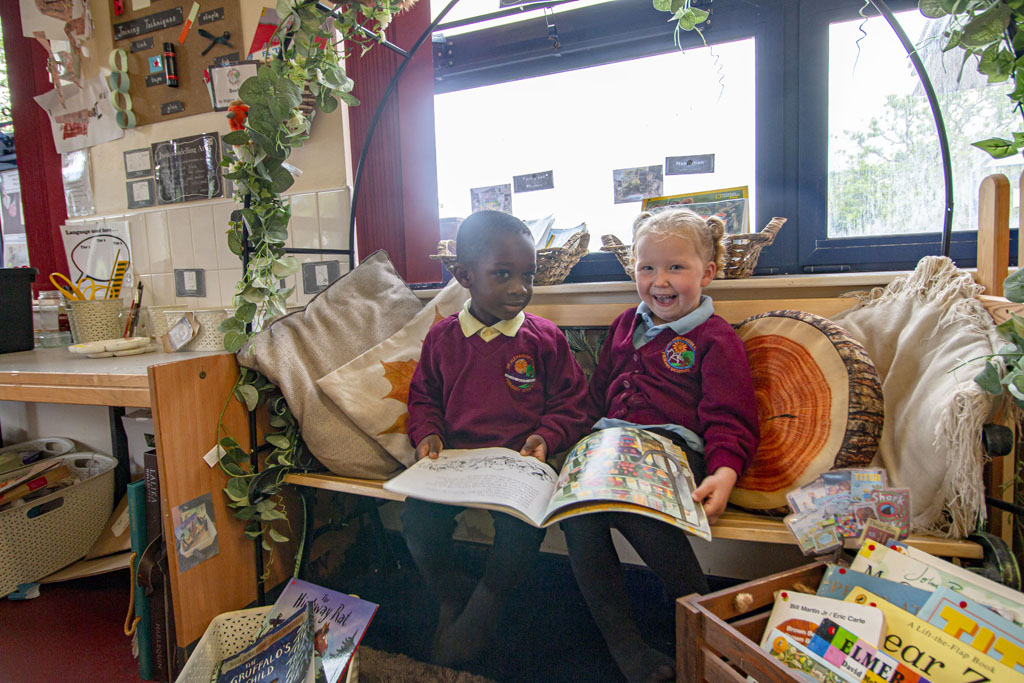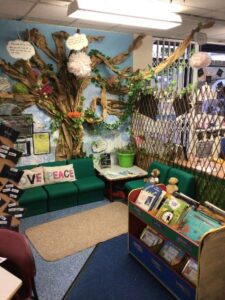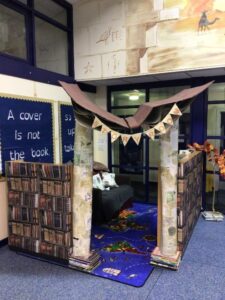
At Sir Alexander Fleming Nursery and Primary School we recognise the importance of reading to give our pupils the passion and love of reading to thrive. We recognise that reading is a fundamental right and skill to effectively communicate. Our curriculum is designed to give children the opportunities to read a wide variety of books, to discover various authors and a range of genres. It also gives an increased opportunity to research, gather further knowledge and extend their understanding of the world around them.
Please click on the links below to view Sir Alexander Fleming’s Curriculum Documents for Reading:
Curriculum Statement for Reading
Reading Policy 25-26
Progression document reading 25-26
You can find the wonderful books children study and use here:
Year 1 LTP Year 2 LTPYear 3 LTPYear 4 LTPYear 5 LTPYear 6 LTPEYFS Reading LTP Key Texts 2025-26
Reading adaptive teaching at SAF
Reading is a crucial part of our curriculum and a key life skill that children need to become successful. At Sir Alexander Fleming we have a passion and love for reading and children take pride in their learning in this subject. It is our highest priority that children develop reading for pleasure through the rich reading culture we create and that they develop personal tastes and opinions. We aim to create successful, confident readers who enjoy reading aloud and are brave enough to perform reading to others.
Throughout their time at our school children will explore a range of texts which reflect a diverse range of cultures, characters and scenarios. In this way children are developing their understanding and respect for others.
A Sir Alexander Fleming reader will have a secure phonic knowledge and be able to decode words fluently. They will have an extending knowledge of grammar, sentence and text structure and vocabulary. Children will comprehend and be able to understand a range of texts and use skills such as retrieval, prediction and inference.
Children will be thoughtful and critical readers who can analyse and interpret many aspects and view points of texts and distinguish between fact and fiction. They will be able to reflect, question and debate.
Our teaching of reading is underpinned by our belief that reading unlocks children’s potential in all other curriculum areas. It is our long term aim that children will use reading to further their knowledge in other subjects. We also recognise that our whole-school curriculum offer develops our children’s background and contextual knowledge and in turn their comprehension skills.
Our Reading Vision
We want all our children, by the end of the EYFS, to be able to know a range of traditional stories. They will be able to act out stories using props and puppets using their growing spoken language. They will know stories from their reading spine and be able to make attempts at retelling them. They will apply their phonetic knowledge to read phonetically plausible books.
We want all our children, by the end of KS1 to have built up a repertoire of stories including their knowledge of fairy tales and traditional tales. They will be aware of their interests and be able to talk about reasons why they enjoyed a book. Children will be able to innovate stories and create their own. They will be reliable decoders and become fluent and expressive readers.
We want all our children by the end of KS2 to become effective, competent communicators and good listeners. They will be able to read, discuss and respond to a variety of texts at an age appropriate level. They will express opinions, articulate their feelings and formulate their responses to a range of texts of different genres. Children will foster an interest in words and their meanings and develop a growing vocabulary. It is our hope that all children will develop a love of and real eagerness for reading, choosing texts appropriately and sharing them enthusiastically. We will aim to equip all children with the reading skills to access the curriculum and the wider world around them.
How do we teach reading successfully at Sir Alexander Fleming Primary School and Nursery?
Children are given many opportunities at our school to develop and apply their reading skills. Teaching strategies are used in accordance with pupils’ age and level of attainment and learning needs.

Phonics presentation for parents
Jolly phonics overview 25-26
Tracking Document Jolly Phonics SAF
You can find more information and resources about how we teach phonics at www.jollylearning.co.uk.
- We teach high-quality phonics on a daily basis to children using the Jolly Phonics Scheme in order to develop their decoding skills.
- Children read independently to adults using books matched to their phonic ability.
- We teach guided reading in carefully sequenced lessons in order to develop children’s comprehension skills.
- We teach reading by using quality texts in a range of genres. These texts are also used to inspire writing.
- Children read to learn by using carefully selected texts across the curriculum.
- Children hear adults read every day.
- We develop reading through pleasure in a range of ways such as through author and library visits, buddy reading and well resourced reading areas.
Our Reading Offer
- Children read every day.
- Children who find reading challenging read more and participate in extra phonics teaching.
- Children in Year 2 and KS2 participate in five guided reading sessions a week.
- Children in the EYFS and KS1 participate in daily phonics sessions.
- All children listen to an adult read every day.
- All children participate in buddy reading once a week.
- All children in nursery share a book with an adult twice every day.
- All children in KS2 access Cold Texts through Reading Plus three times a week.
How do we support parents to help their children to become better readers?
We encourage our parents to read with their child every day. Parents record their children’s reading on Seesaw by taking a photograph, video or making a comment.
Children can access Reading Plus at home and this provides parents with examples of comprehension questions in order to support their child’s understanding.
We invite parents into school to talk about how reading is taught and share resources with them.
We invite our parents to morning reading sessions and phonics sessions.
Ultimately, reading is a master skill, and it will unlock the academic curriculum in all subjects. Reading enables pupils to expand their experiences and opens doors to other worlds!


